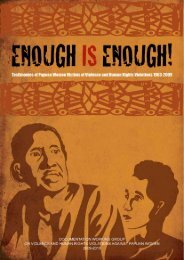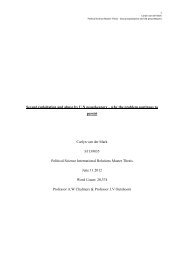The Impact of Armed Conflict on Women and Girls - UNFPA
The Impact of Armed Conflict on Women and Girls - UNFPA
The Impact of Armed Conflict on Women and Girls - UNFPA
You also want an ePaper? Increase the reach of your titles
YUMPU automatically turns print PDFs into web optimized ePapers that Google loves.
Report <str<strong>on</strong>g>of</str<strong>on</strong>g> Working Group Four:<br />
<str<strong>on</strong>g>The</str<strong>on</strong>g> Role <str<strong>on</strong>g>of</str<strong>on</strong>g> NGOs in Post-<str<strong>on</strong>g>C<strong>on</strong>flict</str<strong>on</strong>g> Situati<strong>on</strong>s for <strong>Women</strong> <strong>and</strong> <strong>Girls</strong><br />
Introducti<strong>on</strong><br />
During the last decade, NGOs <strong>and</strong> other civil-society entities have made<br />
significant advances in shaping the global agenda for democratizati<strong>on</strong>,<br />
development <strong>and</strong> peace. <strong>Women</strong>’s NGOs have played an especially important<br />
role in mainstreaming gender in the outcomes <str<strong>on</strong>g>of</str<strong>on</strong>g> the United Nati<strong>on</strong>s global<br />
c<strong>on</strong>ferences <str<strong>on</strong>g>of</str<strong>on</strong>g> the 1990s. <str<strong>on</strong>g>The</str<strong>on</strong>g>y have promoted at all levels women’s human<br />
rights, family reform legislati<strong>on</strong>, reproductive rights <strong>and</strong> the end <str<strong>on</strong>g>of</str<strong>on</strong>g> violence<br />
against women. NGOs have also played significant roles in highlighting the<br />
adverse c<strong>on</strong>sequences <str<strong>on</strong>g>of</str<strong>on</strong>g> globalizati<strong>on</strong> <strong>on</strong> the quality <str<strong>on</strong>g>of</str<strong>on</strong>g> life, particularly for<br />
vulnerable groups such as women <strong>and</strong> children. <str<strong>on</strong>g>The</str<strong>on</strong>g>ir visi<strong>on</strong>, organizati<strong>on</strong>al<br />
flexibility, independence <strong>and</strong> wide outreach c<strong>on</strong>tinue to make NGOs major<br />
partners for internati<strong>on</strong>al organizati<strong>on</strong>s <strong>and</strong> bilateral d<strong>on</strong>ors.<br />
<str<strong>on</strong>g>The</str<strong>on</strong>g> last two decades have been a period <str<strong>on</strong>g>of</str<strong>on</strong>g> increased c<strong>on</strong>flicts <strong>and</strong><br />
emergencies. NGOs, <strong>and</strong> increasingly women's NGOs, have been at the<br />
forefr<strong>on</strong>t <str<strong>on</strong>g>of</str<strong>on</strong>g> the aid community as it deals with emergencies created by these<br />
c<strong>on</strong>flicts. As such, they are well placed to participate in all processes <str<strong>on</strong>g>of</str<strong>on</strong>g> c<strong>on</strong>flict<br />
resoluti<strong>on</strong> <strong>and</strong> peace-building.<br />
In resp<strong>on</strong>se to emergency situati<strong>on</strong>s, NGOs should be involved in needs<br />
assessment, service delivery, outreach, human rights advocacy, informati<strong>on</strong><br />
disseminati<strong>on</strong> <strong>and</strong> community feedback. <strong>Women</strong>'s NGOs, in particular, need to<br />
be visibly involved to highlight issues <str<strong>on</strong>g>of</str<strong>on</strong>g> women <strong>and</strong> girls, whose culturally based<br />
gender roles <str<strong>on</strong>g>of</str<strong>on</strong>g>ten determine their needs. This is typically overlooked in<br />
emergency situati<strong>on</strong>s, especially if local <strong>and</strong> internati<strong>on</strong>al male agency staffs<br />
marginalize women by interacting solely with other male leaders <strong>and</strong><br />
counterparts.<br />
Even with the experience gained during decades <str<strong>on</strong>g>of</str<strong>on</strong>g> addressing c<strong>on</strong>flict<br />
situati<strong>on</strong>s <strong>and</strong> emergencies, NGOs urgently need to strengthen their capacity to<br />
meet challenges <str<strong>on</strong>g>of</str<strong>on</strong>g> the changing internati<strong>on</strong>al c<strong>on</strong>text, which is characterized by<br />
increasing violence, terrorism <strong>and</strong> nuclear threats.<br />
Given the critical needs <str<strong>on</strong>g>of</str<strong>on</strong>g> emergency situati<strong>on</strong>s in the world, NGOs<br />
should be str<strong>on</strong>gly encouraged <strong>and</strong> supported to adopt preventive <strong>and</strong> prec<strong>on</strong>flict<br />
approaches, in additi<strong>on</strong> to wartime <strong>and</strong> post-c<strong>on</strong>flict interventi<strong>on</strong>s for<br />
women <strong>and</strong> girls. For example, such approaches could involve providing<br />
educati<strong>on</strong> <strong>on</strong> sexual <strong>and</strong> gender-based violence <strong>and</strong> related issues to armed<br />
forces <strong>and</strong> police forces in peacetime. Financial <strong>and</strong> technical support <str<strong>on</strong>g>of</str<strong>on</strong>g> NGOs<br />
35




![IANSA [PDF, 2MB] - PeaceWomen](https://img.yumpu.com/25206379/1/190x123/iansa-pdf-2mb-peacewomen.jpg?quality=85)
![Commitments Sample [PDF, 93KB] - PeaceWomen](https://img.yumpu.com/25206331/1/190x245/commitments-sample-pdf-93kb-peacewomen.jpg?quality=85)










![A Toolkit for Advocacy and Action [PDF, 260KB] - Peace Women](https://img.yumpu.com/25205989/1/190x245/a-toolkit-for-advocacy-and-action-pdf-260kb-peace-women.jpg?quality=85)